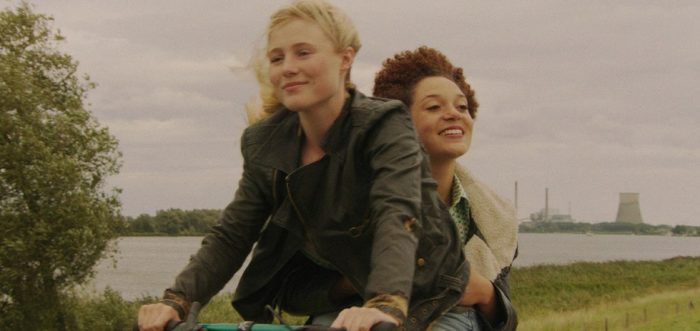
While the film’s two female leads give strong performances and have a magnetic screen presence, Summer is unoriginal and, for the most part, dull and depressing. Sixteen-year-old Anne (Sigrid ten Napel) is restless, bored and resentful of her rural life, a fact she does not fully grapple with until the summer, when a newcomer – the leather-clad, afro sporting motorcyclist Lena (Jade Olieberg) – enters her field of vision. Nicknamed Ms. Silent, Anne is portrayed by ten Napel as someone who obeys social norms and family expectations with small smiles and minimal reluctance. Her personal awakening is prompted by several experiences, among them the unquestioned violence against women in the local, staunchly Catholic community, and the realisation that she would rather get to know the outsider Lena than enjoy a safe summer flirtation with one of her older brother’s friends.
Anne is regularly shown driving and cycling with friends past picturesque European fields marred by the shadow of the local nuclear power plant, the most striking symbolism recurrent throughout Summer. Through this visual motif, accompanied by other shots that purposefully combine the pretty and the horrid, Summer’s visual compositions adequately capture the ambivalence of being an unusual person in an isolated, homogenous and somewhat toxic community that is nonetheless home, a credit to Goert Giltay’s cinematography. Unfortunately, too much emphasis is placed on Anne’s voiceover – covering the underwhelming summer activities available to her, as well as town secrets that feel mostly like a crash-course in misogyny and violence against women – which dominates two-thirds of the 90-minute film, leaving little time for director Colette Bothof to flesh out Summer‘s far more compelling central romance. Additionally, the film’s juxtaposition of young love with a cruel, small town backdrop is tired and derivative, with many of its predecessors having better used the elements Summer employs as in Show Me Love’s lesbian love story, Australian Rules’ mixed-race relationship, and Daydream Nation’s local nuclear plant metaphor.
Despite Summer‘s weak script, the film boasts many strong performances and the fault of the its shortcomings do not lie with any of the actors; both ten Napel and Olieberg are perfectly cast. Anne’s repression and raw longing are palpable, carrying much of the movie, and when it interacts with Lena’s open self-assuredness an innocent but urgent chemistry emerges between the two. Their burgeoning intimacy is at its most tender and fragile in close ups, often with little or no dialogue. The performances from the rest of the village cast, particularly Anne’s cousin Carljin (Lisa Smit), make the most of a poorly-paced narrative. In fact, in cases like Carljin’s brief but impressive screen-time, it seems a lost opportunity that there is not more celebration of women like her, and the young lovers on screen, rather than the dull and gratuitous depictions of the oppression they, and their female peers, face daily. This preoccupation with violence, while obviously well-intended, does not equate to a good film, and certainly not a subversive one when queer people and women are regularly and unimaginatively depicted as victims of abuse on screen, just as they are in Summer.
There is a largely unspoken racial element to the romance between Lena and Anne. Lena is the only visible person of colour shown on screen and in addition to her motorcycle leathers, her untamed afro further separates her from the blindingly white, blonde local kids. Theoretically, the film is to be congratulated for turning the trope of the sexy, ethnically ambiguous “bad girl” on its head by showing Lena to be arguably the most kind and genuine character on screen. However, her treatment by other characters – including a distrust so intense that at one point Anne’s father asks suspiciously “who fathered you?” – is never clearly indicated as racialised rather than just homophobic, and the film’s lack of reference to racism, in favour of homophobia and misogyny, speaks to a broader problematic culture in film of sidelining discussions of race. With a film that was purposefully made to feel “contaminated”, the excessive depictions of the village’s intolerance and encouragement of violence mean the euphoria of the young love Summer strives for is lost somewhat, making for a largely depressing and unpleasant watch.
